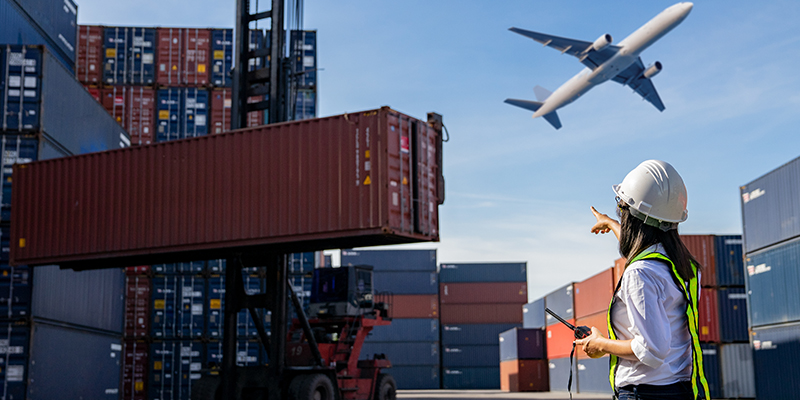
Logistics and supply chain management (SCM) are two interrelated concepts that play a crucial role in the success of any business operation. Both logistics and SCM involve the planning, implementation, and control of the movement and storage of goods, services, and information. This article will provide an overview of the intersection of logistics and SCM, including their definitions, functions, and benefits.
Table of Contents
- Introduction
- What is Logistics?
- Definition
- Functions
- What is Logistics and Supply Chain Management?
- Definition
- Functions
- The Intersection of Logistics and SCM
- Key Differences
- Key Similarities
- Benefits of Integrating Logistics and SCM
- Challenges of Integrating Logistics and SCM
- Future of Logistics and SCM
- Conclusion
- FAQs
1. Introduction
Logistics and SCM are two essential components of any business operation, and they often overlap. Logistics involves the coordination of the physical movement and storage of goods and services, while SCM encompasses the entire process from sourcing raw materials to delivering finished products to customers. The intersection of logistics and SCM is the point where the two concepts meet and work together to create an efficient and effective supply chain.2. What is Logistics?
Definition
Logistics refers to the process of planning, implementing, and controlling the movement of goods and services from the point of origin to the point of consumption. It involves the coordination of various activities such as transportation, warehousing, inventory management, and order processing.Functions
The primary functions of logistics include:- Transportation: the movement of goods from one place to another
- Warehousing: the storage of goods before distribution
- Inventory management: the control of stock levels to ensure optimal availability and minimize waste
- Order processing: the handling of customer orders, including picking, packing, and shipping
3. What is Logistics and Supply Chain Management?
Definition
SCM refers to the coordination of activities involved in the sourcing, production, and delivery of products and services. It encompasses the entire process from the acquisition of raw materials to the delivery of finished goods to customers.Functions
The primary functions of SCM include:- Planning and forecasting: the development of strategies to meet customer demands
- Sourcing: the selection and management of suppliers
- Manufacturing: the production of goods and services
- Delivery: the transportation and delivery of products to customers
4. The Intersection of Logistics and SCM
Key Differences
While logistics and SCM are related concepts, they differ in some key ways. Logistics is focused primarily on the physical movement and storage of goods, while SCM encompasses the entire process from sourcing to delivery. Logistics also tends to be more operationally focused, while SCM is more strategic.Key Similarities
Despite these differences, logistics and SCM share some similarities. Both are concerned with the efficient and effective movement of goods and services, and both require effective coordination and communication between various departments and stakeholders.5. Benefits of Integrating Logistics and SCM
Integrating logistics and SCM can bring many benefits to a business, including:- Improved efficiency: By integrating logistics and SCM, businesses can streamline their operations, reducing waste and increasing efficiency.
- Cost savings: A more efficient supply chain can lead to cost savings, as businesses can reduce their transportation and inventory costs.
- Increased customer satisfaction: A more efficient supply chain can also lead to improved customer satisfaction, as businesses can ensure that products are delivered on time and in good condition.
- Better risk management: An integrated supply chain can also help businesses to manage risks more effectively, as they can quickly identify and respond to potential disruptions.
6. Challenges of Integrating Logistics and SCM
While there are many benefits to integrating logistics and SCM, there are also some challenges that businesses may face. These include:- Complexity: Integrating logistics and SCM can be complex, as it requires effective coordination and communication between various departments and stakeholders.
- Resistance to change: Some employees or stakeholders may resist changes to the existing processes, which can make it difficult to implement new strategies.
- Information technology: Integrating logistics and SCM often requires the use of information technology, which can be costly and time-consuming to implement.
- Data management: Businesses must effectively manage data to ensure that information is accurate and up-to-date across all departments and stakeholders.
7. Future of Logistics and SCM
The future of logistics and SCM is likely to be shaped by several trends, including:- Technology: Advances in technology, such as artificial intelligence and automation, are likely to have a significant impact on logistics and SCM in the future.
- Sustainability: Businesses are increasingly concerned with sustainability and are looking for ways to reduce their carbon footprint and minimize waste.
- Customer experience: The focus on customer experience is likely to continue, as businesses strive to provide fast and efficient delivery options and personalized service.
8. Conclusion
In conclusion, logistics and SCM are two interrelated concepts that play a critical role in the success of any business operation. Integrating logistics and SCM can bring many benefits, including improved efficiency, cost savings, increased customer satisfaction, and better risk management. However, there are also some challenges to overcome, including complexity, resistance to change, and data management. Looking ahead, the future of logistics and SCM is likely to be shaped by trends such as technology, sustainability, and customer experience.9. FAQs
- What is the difference between logistics and supply chain management?
- Logistics is focused primarily on the physical movement and storage of goods, while supply chain management encompasses the entire process from sourcing to delivery.
- What are the benefits of integrating logistics and supply chain management?
- Benefits include improved efficiency, cost savings, increased customer satisfaction, and better risk management.
- What are some of the challenges of integrating logistics and supply chain management?
- Challenges include complexity, resistance to change, and data management.
- What is the future of logistics and supply chain management?
- The future is likely to be shaped by trends such as technology, sustainability, and customer experience.
- Why is logistics and supply chain management important for businesses?
- Logistics and supply chain management are important for businesses because they play a critical role in the success of any business operation, from sourcing raw materials to delivering finished products to customers






